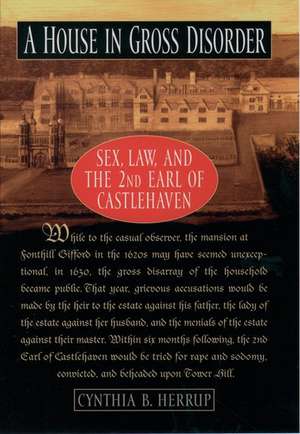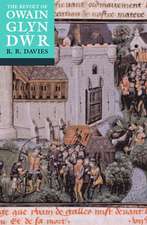A House in Gross Disorder: Sex, Law, and the 2nd Earl of Castlehaven
Autor Cynthia Herrupen Limba Engleză Paperback – 29 mar 2001
Preț: 120.95 lei
Preț vechi: 127.65 lei
-5% Nou
Puncte Express: 181
Preț estimativ în valută:
23.15€ • 24.13$ • 19.24£
23.15€ • 24.13$ • 19.24£
Carte tipărită la comandă
Livrare economică 10-17 martie
Preluare comenzi: 021 569.72.76
Specificații
ISBN-13: 9780195139259
ISBN-10: 0195139259
Pagini: 232
Ilustrații: 8 halftones
Dimensiuni: 216 x 139 x 16 mm
Greutate: 0.32 kg
Ediția:Revised
Editura: Oxford University Press
Colecția OUP USA
Locul publicării:New York, United States
ISBN-10: 0195139259
Pagini: 232
Ilustrații: 8 halftones
Dimensiuni: 216 x 139 x 16 mm
Greutate: 0.32 kg
Ediția:Revised
Editura: Oxford University Press
Colecția OUP USA
Locul publicării:New York, United States
Recenzii
"Cynthia Herrup's A House in Gross Disorder makes us rethink most everything we thought we knew about the notorious 1631 `sodomy' trial of Mervin Touchet, the 2nd Earl of Castlehaven. Beautifully written and meticulously crafted, Herrup's study unfolds like a good detective story."--Jean Howard, Department of English, Columbia University, and Director of the Institute for Research on Women and Gender
"Cynthia Herrup's scrupulous reconstruction of the Castlehaven scandal and its legacy is an utterly fascinating read. But it is also rich in theoretical implications for the history of sexuality. Herrup shows how obscure conflicts within Castlehaven's household embodied virtually all the social and political tensions of the period, and thus how a routine dispute over property and inheritance could quickly escalate into a sensational trial for rape and sodomy. The nature of Castlehaven's transgression, which subsequent retelling of the story have radically simplified, recovers here its tantalizing ambiguity and complexity."--David M. Halperin, author of One Hundred Years of Homosexuality Saint Foucalt
Her review of the documents is exhaustive and scrupulous, and her style is as compelling as the drama she reconstructs.
'Irresistible ... a terrific story, well told.' Marcel Berlins, Mail on Sunday, 9.1.2000
"This is an extraordinary tale extraordinarily well told, but told with an ear cocked to the ways in which contemporaries themselves told and retold it. Like the trial itself, Herrup never quite gets to teh bottom of `what really happened,' but en route to that acceptance of indeterminacy the book sets the Castlehaven affair precisely on a number of pressure points and fault lines in the culture and society of early modern England. The result is a book with considerable resonance for anyone interested in the political, legal, social, cultural, or gender history of seventeenth-century England."--Peter Lake, Department of History, Princeton University
"To this sorry tale of a grossly disordered household, of a weak patriarch, loveless marriages, corrupt and venal servants, is added the betrayal of a son, fearful of losing his inheritance, the irregularities, if not worse, of prejudiced court adn irregular trial procedure, of predatory aristocratic relatives, and of Castlehaven's dubious connection with Catholicism and Ireland.... It is a cautionary tale on many levels that haunted succeeding generations; its eloquent retelling ought now to haunt ours."--Paul Seaver, Department of History, Stanford University
"Cynthia Herrup's scrupulous reconstruction of the Castlehaven scandal and its legacy is an utterly fascinating read. But it is also rich in theoretical implications for the history of sexuality. Herrup shows how obscure conflicts within Castlehaven's household embodied virtually all the social and political tensions of the period, and thus how a routine dispute over property and inheritance could quickly escalate into a sensational trial for rape and sodomy. The nature of Castlehaven's transgression, which subsequent retelling of the story have radically simplified, recovers here its tantalizing ambiguity and complexity."--David M. Halperin, author of One Hundred Years of Homosexuality Saint Foucalt
Her review of the documents is exhaustive and scrupulous, and her style is as compelling as the drama she reconstructs.
'Irresistible ... a terrific story, well told.' Marcel Berlins, Mail on Sunday, 9.1.2000
"This is an extraordinary tale extraordinarily well told, but told with an ear cocked to the ways in which contemporaries themselves told and retold it. Like the trial itself, Herrup never quite gets to teh bottom of `what really happened,' but en route to that acceptance of indeterminacy the book sets the Castlehaven affair precisely on a number of pressure points and fault lines in the culture and society of early modern England. The result is a book with considerable resonance for anyone interested in the political, legal, social, cultural, or gender history of seventeenth-century England."--Peter Lake, Department of History, Princeton University
"To this sorry tale of a grossly disordered household, of a weak patriarch, loveless marriages, corrupt and venal servants, is added the betrayal of a son, fearful of losing his inheritance, the irregularities, if not worse, of prejudiced court adn irregular trial procedure, of predatory aristocratic relatives, and of Castlehaven's dubious connection with Catholicism and Ireland.... It is a cautionary tale on many levels that haunted succeeding generations; its eloquent retelling ought now to haunt ours."--Paul Seaver, Department of History, Stanford University
Notă biografică
Cynthia Herrup is Professor of History and Law, Duke University. She is the former editor of the Journal of British Studies and the author of The Common Peace: Participation and the Criminal Law in 17th Century England. She lives in Durham, North Carolina.













